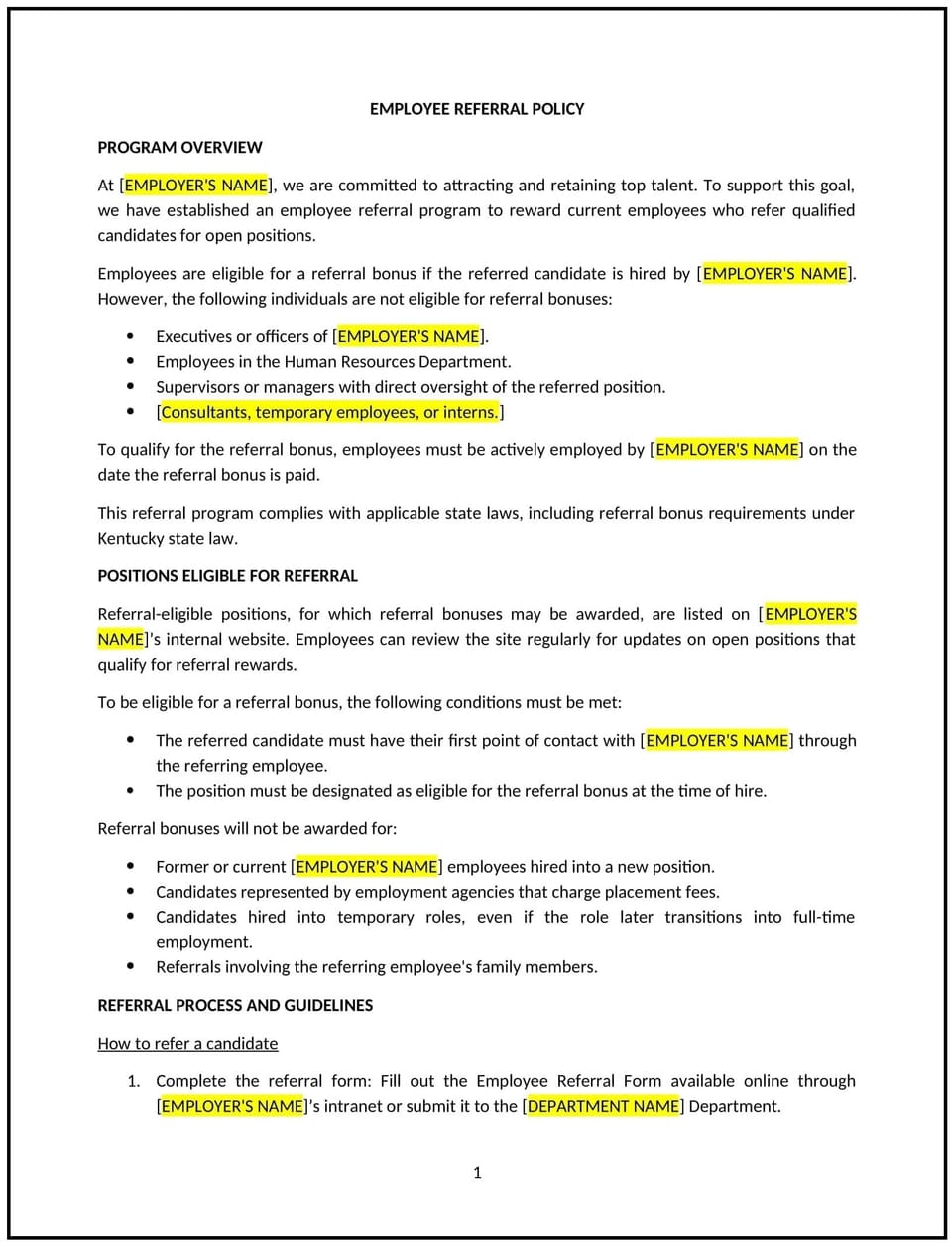Employee referral policy (Kentucky): Free template

Employee referral policy (Kentucky)
An employee referral policy outlines the guidelines for Kentucky businesses to encourage employees to refer qualified candidates for open positions. This policy includes the criteria for eligibility, referral bonuses, and the process for submitting and evaluating referrals.
By adopting this policy, businesses can leverage their employees' networks, improve recruitment efforts, and enhance employee engagement.
How to use this employee referral policy (Kentucky)
- Define eligibility: Specify which employees are eligible to participate in the referral program, such as full-time employees or those in certain departments.
- Outline the referral process: Provide clear instructions on how employees can submit referrals, including the information needed, such as resumes or LinkedIn profiles.
- Detail the referral bonus: Clearly explain the incentive or bonus structure for successful referrals, including any payout conditions, such as the candidate’s hire date or length of employment.
- Set guidelines for candidate qualifications: Specify the types of positions eligible for referral, such as full-time roles, part-time roles, or temporary positions, and outline the skills or experience required for candidates.
- Explain candidate evaluation: Outline how referrals will be evaluated and the timeline for notifying employees about the outcome of their referral.
- Address confidentiality: Ensure that the referral process respects candidates' privacy and that all information provided is handled confidentially.
- Specify exclusions: Identify any roles or employees who are excluded from the referral program, such as management positions or those directly involved in recruitment.
Benefits of using this employee referral policy (Kentucky)
This policy provides several advantages for Kentucky businesses:
- Strengthens recruitment: Leverages the network of current employees to find high-quality candidates who fit the company’s culture and needs.
- Reduces hiring costs: Lowers recruitment costs by using internal networks to identify candidates instead of relying solely on external job boards or agencies.
- Enhances employee engagement: Involves employees in the hiring process and rewards them for contributing to the company’s success.
- Improves candidate quality: Employee referrals often lead to hires with a better cultural fit and higher retention rates.
- Supports faster hiring: Referrals typically streamline the hiring process, reducing the time needed to fill open positions.
Tips for using this employee referral policy (Kentucky)
- Communicate the policy: Ensure employees understand the referral process by sharing the policy during onboarding and regularly reminding them of the program’s benefits.
- Monitor referrals: Track referrals to evaluate the effectiveness of the program and adjust incentives or processes as needed.
- Offer attractive incentives: Provide meaningful rewards for successful referrals to motivate employees to participate actively in the program.
- Promote inclusivity: Encourage all employees to refer candidates from diverse backgrounds, ensuring equal opportunities for all potential applicants.
- Review periodically: Update the policy as necessary to reflect changes in recruitment needs, market trends, or Kentucky labor laws.
Q: What is the purpose of an employee referral policy?
A: The policy encourages employees to refer qualified candidates for open positions, improving recruitment and enhancing employee involvement.
Q: Who can participate in the referral program?
A: The policy specifies which employees are eligible to participate, typically full-time staff, with possible exclusions for certain roles or departments.
Q: How are referrals submitted?
A: Employees submit referrals through a designated process, such as submitting resumes or profiles through email, an online portal, or HR systems.
Q: What is the reward for successful referrals?
A: Employees are typically rewarded with a referral bonus, which is paid after the referred candidate is hired and meets any specified conditions, such as staying with the company for a certain period.
Q: Are there any restrictions on what roles can be referred?
A: The policy specifies which positions are eligible for referrals, such as full-time, part-time, or specific job categories, and outlines any candidate qualifications required.
Q: Will employees be informed about the outcome of their referral?
A: Employees are notified about the status of their referral, including whether the candidate has been hired or if the referral was not successful.
Q: How often should the employee referral policy be reviewed?
A: The policy should be reviewed regularly, at least annually, to ensure it remains effective and aligned with business goals and labor market trends.
This article contains general legal information and does not contain legal advice. Cobrief is not a law firm or a substitute for an attorney or law firm. The law is complex and changes often. For legal advice, please ask a lawyer.


